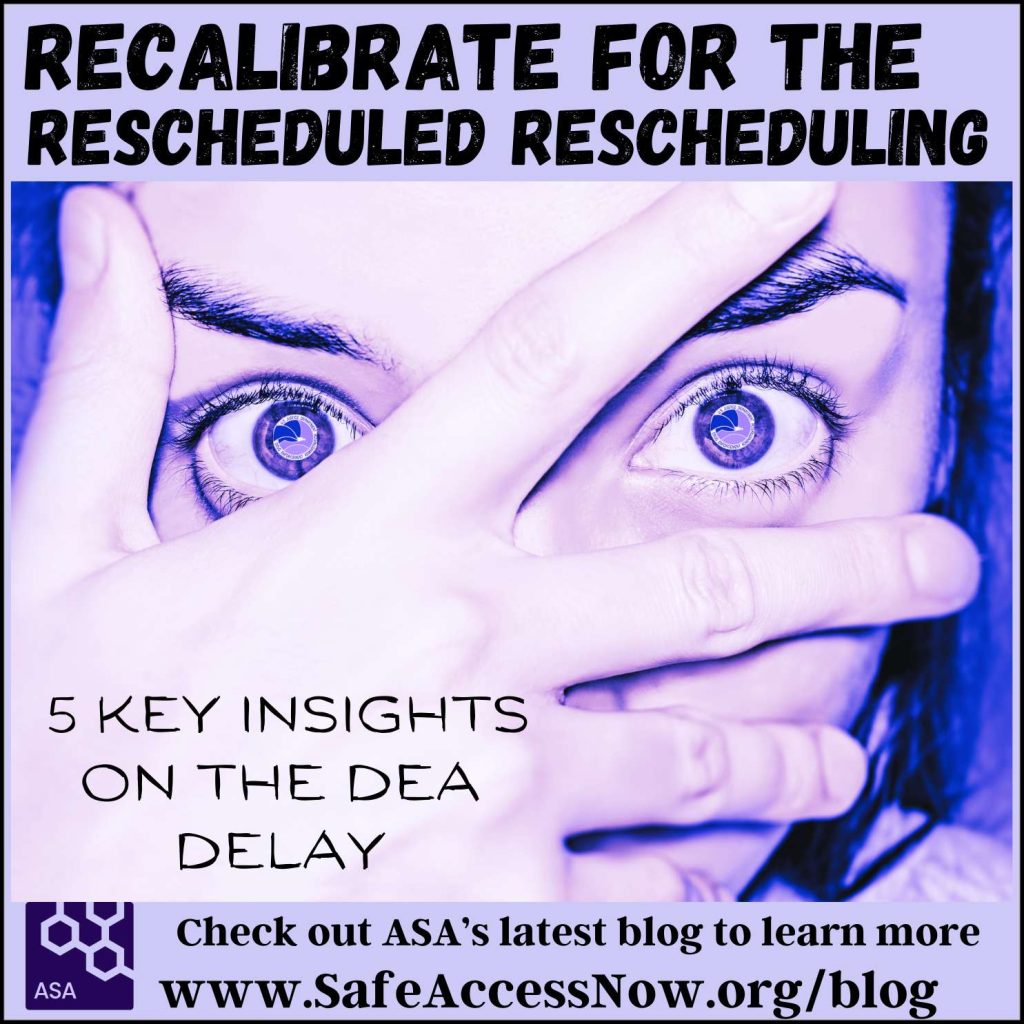Recalibrating for the Rescheduled Rescheduling: 5 Key Insights on the DEA Delay

TAKE A BREATH
The Administrative Law Judge recently postponed the DEA’s highly anticipated rescheduling hearing and released the DEA’s witness list, prompting speculation, conspiracies, and anxiety about the delay and the agency’s next moves.
Before you pull your hair out, read these five essential points to put your mind at ease. With your hair intact, you can focus on the one area where you can impact rescheduling—(wait for it).
1.  INFLUENCE OF THE OVAL OFFICE
INFLUENCE OF THE OVAL OFFICE
Both Kamala Harris and Donald Trump have voiced support for moving cannabis to Schedule III or even legalizing it. However, these changes can’t be made from the White House alone. The current rescheduling process, now led by the DEA (which has shown resistance to moving cannabis to Schedule III), will also be beyond the control of the 47th President. (For more on the Power of the White House & Cannabis).
2. CJS AMENDMENT IN THE HOUSE BILL
This year, the House passed two amendments to the Commerce, Justice, Science (CJS) appropriations bill with serious implications for patients. Section 623 prevents the DOJ from using funds to reschedule cannabis. If this survives in the final merged bill with the Senate, it could halt the rescheduling process entirely. While this outcome is unlikely, it’s important to note that the same committee included “clawback” language for the decade-old medical cannabis amendment, potentially allowing federal enforcement of cannabis laws in sensitive areas. Read more about the CJS.
3. READING THE TEA LEAVES: THE DELAY & WITNESS LIST

The shortest cannabis rescheduling process in history took five years and ended in denial without a hearing. Expecting this process to conclude by the election was, at best, overly optimistic. After the DOJ published its notice to reschedule for public comment, the DEA’s questions to the Office of Legal Counsel (OLC) and its response to HHS’s findings suggested the agency would seek a public hearing. ASA’s public comments for the rescheduling focused on demonstrating to the DEA the developments that have happened in medical cannabis since the 2016 Rescheduling Denial.
- 1st Petition: 1972–1993 (Hearing: 1985–1988)
- 2nd Petition: 1995–2001
- 3rd Petition: 2002–2011
- 4th Petition: 2009–2016
- 5th Petition: 2011–2016
- Current Petition: October 2022–?
The witness list for the hearing includes a variety of stakeholders, likely chosen to prepare for the lawsuits that will likely follow any outcome, but a majority do not agree with Schedule III either because it goes too far or not far enough!
4. IMPACT OF THE DELAY
The delay won’t affect patients, and the truth is if cannabis is moved to Schedule II or III, it will affect perceptions of cannabis medicines (WHICH IS A BIG DEAL, especially for the work left to do), but it won’t impact the current access programs for better or worse. Protections under the “CJS Medical Cannabis Amendment” will remain when it is rescheduled. However, stricter federal regulations could apply to commercial cannabis activities, and state programs wouldn’t automatically align with federal oversight. Patients would not require prescriptions for access to cannabis from state medical cannabis programs, and products in state markets wouldn’t qualify for federally regulated protocols, clinical trials, or insurance coverage without Congressional Action.
Unregulated Schedule II/III substances are federally illegal, and their protection requires a prescription. Fortunately, the federal government rarely enforces simple possession. However, cultivating, manufacturing, or distributing these substances outside federal regulations is considered trafficking and carries significant penalties.
Tax Implications of Delay: The rescheduling delay means another year under Section 280E, which restricts tax deductions for cannabis businesses. However, even if cannabis moves to Schedule III, other tax codes (e.g., Section 162(c)(2)) still apply, and Congress would need to create specific exemptions for full tax benefits. (This presentation includes a deep dive into everything you need to know about the current rescheduling process).
5. CONGRESS HOLDS THE KEY TO REAL REFORM
Only Congress can implement comprehensive reforms that provide consistent access, protection, and integration of medical cannabis into healthcare. With just days left before the election, patients and advocates should continue urging candidates to pledge their support for medical cannabis reform. Visit Compassionate Candidate Actions to learn how you can get involved.
THE TAKE AWAY? TAKE ACTION: KEEP THE PRESSURE ON CANDIDATES
The delay in rescheduling underscores a crucial point: only Congress has the power to bring meaningful, lasting change for medical cannabis patients. As the election approaches, patients, advocates, and allies must make their voices heard. Reach out to candidates and demand a clear stance on medical cannabis. Ask them to pledge their support for federal reforms that will protect patient access and integrate cannabis into healthcare.
There is Still Time to Get involved with Compassionate Candidate Actions.





